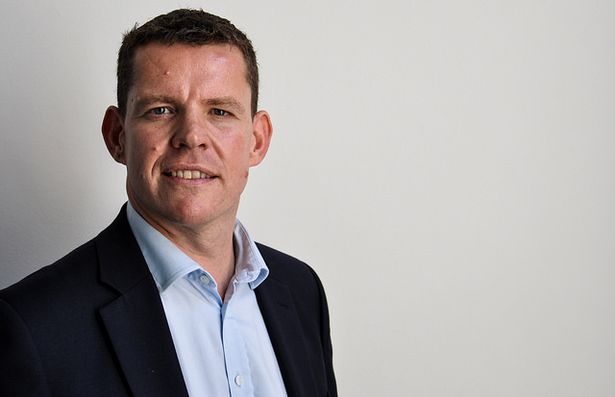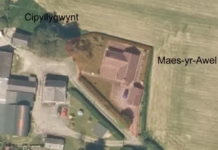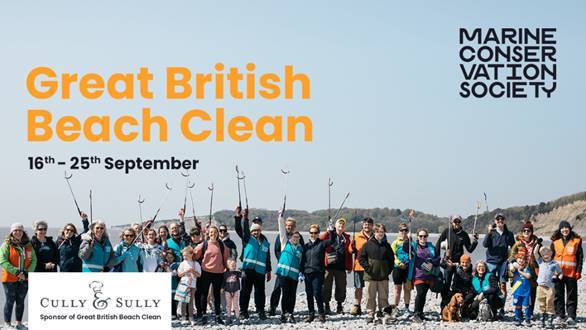Volunteers taking part will not only be clearing our beaches of litter, but help the Marine Conservation Society tackle ocean pollution by gathering vital data used to lobby governments and create change for cleaner seas and a healthier planet.
This year’s Great British Beach Clean is sponsored by Ireland’s number one soup brand, Cully & Sully.
To sign up for a beach clean, or set up your own, simply visit the charity’s website.
Key stats and facts
· At last year’s Great British Beach Clean, 55,776 metres of beach across the UK were cleared and surveyed by 5,909 volunteers. They collected 1,638 bin bags filled with 4,832.9kg of rubbish.
· 75% of all litter collected across the UK during last year’s Great British Beach Clean was made of plastic or polystyrene.
· Plastic bags on beaches continue to become less commonplace, from a high of 13 on average in 2013, down to just 3 in 2021.
· Sewage plays a large part in the pollution problem. In 2021 an average of 38 items of sewage-related pollution were found per 100 metres of Scottish beach; items like period and sanitary products and wet wipes. (This is compared to 20 items in England, 11 in Wales and 10 in Northern Ireland)
· There are 2,540 storm overflows within 1km of Marine Protected Areas (MPA) in England. A shocking 440,508 hours of sewage spilling took place in 2021.
· Data from the Marine Conservation Society’s Great British Beach Clean contributes to a global database, International Coastal Cleanup.
Key messages:
· Action taken on a national, local, and personal scale is having an impact. Data collected by the Marine Conservation Society shows the impact of policies like carrier bag charges and single-use plastic bans in the years that follow. Beach litter is going down.
· But, plastic still remains the most common form of beach pollution – more ambitious, wide-ranging policies to cut down on single-use plastics, and their littering, are needed.
· Sewage-related pollution, like period products and wet wipes, are some of the most commonly found items on our beaches. We’re calling for a ban on plastic in wet wipes to help reduce their impact if they are misflushed.
· However, this is only the tip of the iceberg when it comes to how storm overflows affect our seas. Not only is litter being pumped into our ocean, but a harmful mix of sewage and chemicals is being directly poured into our rivers and beaches.
· The Marine Conservation Society is calling for tougher action by UK Government in their new Storm Overflows Discharge Reduction Plan, which fails to protect estuaries and coastal waters, by excluding around 600 storm overflows which will continue to dump uncontrolled amounts of sewage directly into English seas and beaches.
· The charity is also calling on the Scottish Government to set progressive reduction targets for spills from Combined Sewage Overflows (CSOs) by the end of 2022 and; install electronic monitoring on all overflows by 2024, with data published on an annual basis.
· You can take action by clearing the UK’s beaches and collecting vital data to help support work in tackling pollution for good, for cleaner seas and a healthier planet.
For those not able to get to the coast, the Source to Sea Litter Quest is an inland version of the charity’s survey, highlighting some of the most common litter items found on the coast. For more information on taking part inland, visit: https://www.mcsuk.org/what-you-can-do/join-a-beach-clean/source-to-sea-litter-quest/
Quotes
If you would like to arrange an interview, please get in touch.
ON SEWAGE POLLUTION:
Rachel Wyatt, the Marine Conservation Society’s Water Quality Policy & Advocacy Manager: “For too long, our ocean has had a raw deal – literally. The UK Government’s latest plans for England don’t go far enough to address the raw sewage which enters our ocean far too frequently. By ignoring sewage discharges going into estuaries and coastal areas not identified as bathing waters, the UK Government is disregarding the health of our seas at large.
“In Scotland, recent bathing water results have highlighted the need for the Scottish Government to ensure that all storm overflows are monitored so that their contribution to coastal pollution can be clearly accounted for.”
ON OCEAN POLLUTION:
Dr Laura Foster, Head of Clean Seas at the Marine Conservation Society, said: “Pollution, whether it’s big, small or even invisible, is having a hugely negative impact on our ocean and all those who rely on it – including us. Tiny microplastics are being eaten by plankton at the very foundation of ocean ecosystems, animals big and small are being tangled in plastic packaging, turtles are mistaking it for food, and chemical pollution is changing the ocean’s chemistry.
“All of this is an alarming picture of the state of our seas, but each and every volunteer who joins the Great British Beach Clean helps us research the scale of pollution in the UK. This research is vital to stop pollution at source, and we know it works. Cleaner beaches will support a healthy ocean, and a healthy planet.”
Clare Trotman, Beachwatch Officer at the Marine Conservation Society, said: “We wouldn’t be able to do the work we do at the Marine Conservation Society without the support of our volunteers heading out to the coast to collect vital information on what’s polluting our seas.
“With beach cleans happening across the UK, from remote beaches to busy seaside resorts, there’s so many ways to get involved and support us this year. If you can’t make it to the beach, you can still take part by doing a local litter pick and survey where you live.”
Media opportunities
The Marine Conservation Society’s team will be hosting beach cleans throughout the week, with some available to host broadcast crews for interview. If you would like to arrange some filming/interviews for the launch of the Great British Beach Clean on 16th September, the following beach cleans are currently set to take place:
| Date | Region | County | Beach & link – please let us know if you would like to attend |
| 16/09/2022 | Wales | Denbighshire | Rhyl slipways |
| 17/09/2022 | Wales | Conwy | Rhos-On-Sea |
| 17/09/2022 | Wales | Conwy | Llandudno North Shore |
| 17/09/2022 | Scotland | City of Edinburgh | Cramond |
| 17/09/2022 | England | Merseyside | New Brighton |
| 17/09/2022 | South West | Somerset | Sand Bay |
| 18/09/2022 | South West | Devon | Fort Bovisand Beach |
| 18/09/2022 | Wales | Swansea | Langland Bay |
| 19/09/2022 | South East | London | Source to Sea – inland surveys in London (locations TBC) |
| 22/09/2022 | South | East Sussex | Hove, King Alfred Leisure Centre |
| 24/09/2022 | Scotland | City of Edinburgh | South Queensferry |
| 25/09/2022 | Wales | Swansea | Port Eynon Bay |
Please get in touch if you’d like to arrange for a crew to join a beach clean.

| [donate]
| Help keep news FREE for our readersSupporting your local community newspaper/online news outlet is crucial now more than ever. If you believe in independent journalism,then consider making a valuable contribution by making a one-time or monthly donation. We operate in rural areas where providing unbiased news can be challenging. |






















